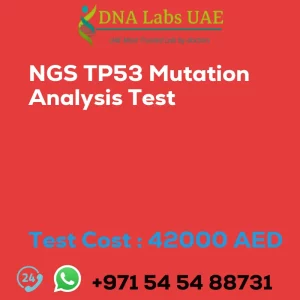VERY LONG CHAIN FATTY ACIDS Test
Test Name: VERY LONG CHAIN FATTY ACIDS Test
Components:
- Phytanic Acid
- Pristanic Acid
- Docosanoic, C22:0
- Tetracosanoic, C24:0
- Hexacosanoic, C26:0
- Ratio C24/C22
- Ratio C26/C22
- Ratio Pristanic/Phytanic
Price: 5100.0 AED
Sample Condition: 2 mL (1 mL min.) serum in 1 Red Top (No Additive) tube. Do not use SST gel barrier tubes. Ship refrigerated or frozen. Avoid alcohol 24 hours prior to sample collection. Overnight fasting is mandatory. For pediatric patients, fasting is not required but sample collection should occur prior to the next meal or scheduled feeding. Patient age & gender is essential for calculation of result. Duly filled Test Send Out Consent Form is mandatory.
Report Delivery: Sample by 7th of the month; Report after 2-3 weeks
Method: Gas Chromatography / Tandem Mass Spectrometry
Test type: Genetic diseases
Doctor: Physician
Test Department: OS
Pre Test Information: Avoid alcohol 24 hours prior to sample collection. Overnight fasting is mandatory. For pediatric patients, fasting is not required but sample collection should occur prior to the next meal or scheduled feeding. Duly filled Test Send Out Consent Form is mandatory.
Test Details
The Very Long Chain Fatty Acids (VLCFAs) test is a diagnostic test that measures the levels of VLCFAs in the blood, urine, or other tissues of a patient. VLCFAs are a type of fatty acid that are longer than 22 carbons in length. They are important components of cell membranes and are also involved in various metabolic processes in the body.
The VLCFAs test is used to diagnose a group of inherited disorders known as the peroxisomal disorders. These disorders are caused by defects in the peroxisomes, which are small organelles within cells that are involved in the metabolism of various substances, including VLCFAs. Patients with peroxisomal disorders have abnormal levels of VLCFAs in their blood and tissues, which can lead to a variety of symptoms, including neurological problems, vision loss, and liver dysfunction.
The most common peroxisomal disorder is X-linked adrenoleukodystrophy (X-ALD), which affects about 1 in 20,000 people. X-ALD is caused by mutations in the ABCD1 gene, which encodes a protein that is involved in the transport of VLCFAs into the peroxisomes. Patients with X-ALD have elevated levels of VLCFAs in their blood and tissues, which can lead to a range of symptoms, including adrenal insufficiency, neurological problems, and vision loss.
The VLCFAs test is also used to monitor patients with X-ALD and other peroxisomal disorders. Patients with X-ALD are typically monitored by measuring their VLCFA levels every 6-12 months, as elevated levels can indicate disease progression. In addition, VLCFA levels can be used to monitor the effectiveness of treatment, such as dietary changes or medication.
The VLCFAs test is typically performed on a blood sample, although it can also be performed on urine or other tissues. The test involves extracting the VLCFAs from the sample and then measuring their levels using a specialized instrument called a gas chromatograph-mass spectrometer (GC-MS). The results of the test are reported as the levels of various VLCFAs, such as hexacosanoic acid (C26:0) or tetracosanoic acid (C24:0).
In summary, the Very Long Chain Fatty Acids (VLCFAs) test is a diagnostic test that measures the levels of VLCFAs in the blood, urine, or other tissues of a patient. The test is used to diagnose and monitor patients with peroxisomal disorders, such as X-linked adrenoleukodystrophy (X-ALD). The test involves extracting the VLCFAs from the sample and then measuring their levels using a gas chromatograph-mass spectrometer (GC-MS).
| Test Name | VERY LONG CHAIN FATTY ACIDS Test |
|---|---|
| Components | *Phytanic Acid*Pristanic Acid*Docosanoic, C22:0*Tetracosanoic, C24:0 *Hexacosanoic, C26:0 *Ratio C24/C22 *Ratio C26/C22 *Ratio Pristanic/Phytanic |
| Price | 5100.0 AED |
| Sample Condition | 2 mL (1 mL min.) serum in 1 Red Top (No Additive) tube.Do not use SST gel barrier tubes. Ship refrigerated or frozen. Avoid alcohol 24 hours prior to sample collection. Overnight fasting is mandatory. For pediatric patients, fasting is not required but sample collection should occur prior to the next meal or scheduled feeding. Patient age & gender is essential for calculation of result. Duly filled Test Send Out Consent Formis mandatory. |
| Report Delivery | Sample by 7th of the month; Report after 2??3 weeks |
| Method | GasChromatography / Tandem Mass Spectrometry |
| Test type | Genetic diseases |
| Doctor | Physician |
| Test Department: | OS |
| Pre Test Information | Avoid alcohol 24 hours prior to sample collection. Overnight fasting is mandatory. For pediatric patients, fasting is not required but sample collection should occur prior to the next meal or scheduled feeding. Duly filled Test Send Out Consent Formis mandatory. |
| Test Details |
The Very Long Chain Fatty Acids (VLCFAs) test is a diagnostic test that measures the levels of VLCFAs in the blood, urine, or other tissues of a patient. VLCFAs are a type of fatty acid that are longer than 22 carbons in length. They are important components of cell membranes, and are also involved in various metabolic processes in the body. The VLCFAs test is used to diagnose a group of inherited disorders known as the peroxisomal disorders. These disorders are caused by defects in the peroxisomes, which are small organelles within cells that are involved in the metabolism of various substances, including VLCFAs. Patients with peroxisomal disorders have abnormal levels of VLCFAs in their blood and tissues, which can lead to a variety of symptoms, including neurological problems, vision loss, and liver dysfunction. The most common peroxisomal disorder is X-linked adrenoleukodystrophy (X-ALD), which affects about 1 in 20,000 people. X-ALD is caused by mutations in the ABCD1 gene, which encodes a protein that is involved in the transport of VLCFAs into the peroxisomes. Patients with X-ALD have elevated levels of VLCFAs in their blood and tissues, which can lead to a range of symptoms, including adrenal insufficiency, neurological problems, and vision loss. The VLCFAs test is also used to monitor patients with X-ALD and other peroxisomal disorders. Patients with X-ALD are typically monitored by measuring their VLCFA levels every 6-12 months, as elevated levels can indicate disease progression. In addition, VLCFA levels can be used to monitor the effectiveness of treatment, such as dietary changes or medication. The VLCFAs test is typically performed on a blood sample, although it can also be performed on urine or other tissues. The test involves extracting the VLCFAs from the sample and then measuring their levels using a specialized instrument called a gas chromatograph-mass spectrometer (GC-MS). The results of the test are reported as the levels of various VLCFAs, such as hexacosanoic acid (C26:0) or tetracosanoic acid (C24:0). In summary, the Very Long Chain Fatty Acids (VLCFAs) test is a diagnostic test that measures the levels of VLCFAs in the blood, urine, or other tissues of a patient. The test is used to diagnose and monitor patients with peroxisomal disorders, such as X-linked adrenoleukodystrophy (X-ALD). The test involves extracting the VLCFAs from the sample and then measuring their levels using a gas chromatograph-mass spectrometer (GC-MS). |







